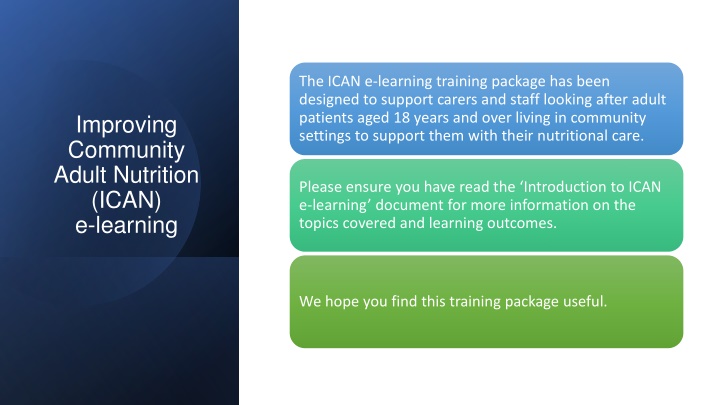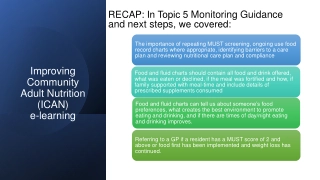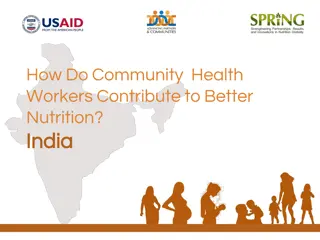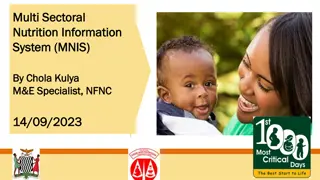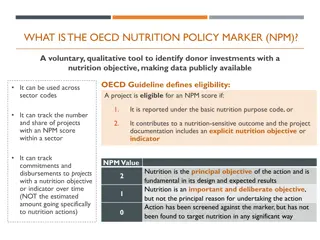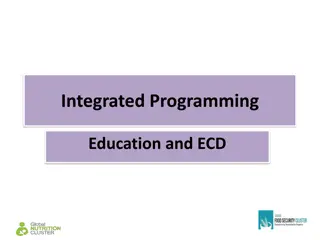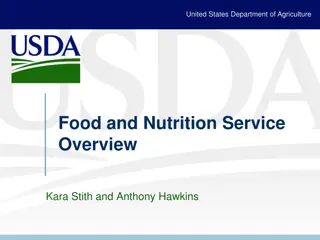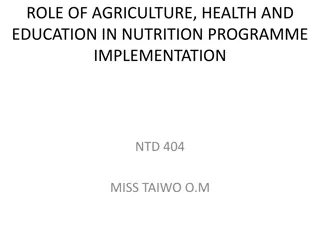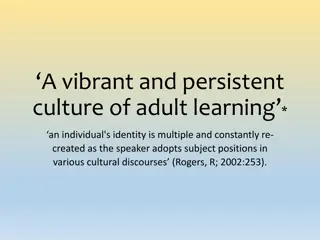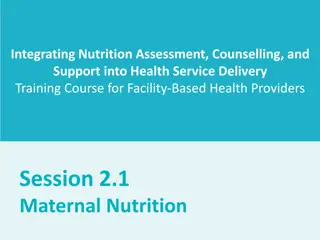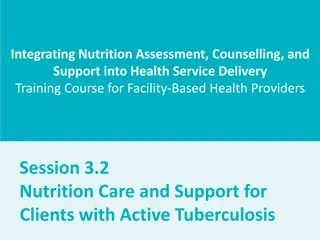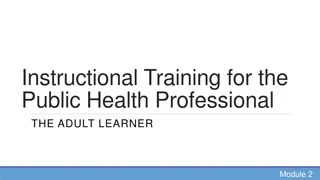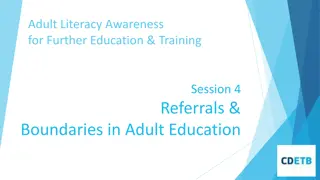Supporting Adult Nutrition in Community Settings - ICAN E-Learning Training
The ICAN E-Learning Training Package is designed to assist carers and staff caring for adult patients aged 18 and over in community settings with their nutritional care. The training covers topics such as national standards in nutrition, defining malnutrition, causes and consequences of malnutrition, and identification of malnutrition. It emphasizes the importance of a balanced diet and highlights the impact of malnutrition on health and social care systems. Nutritional screening is crucial for identifying individuals at risk of malnutrition.
Download Presentation

Please find below an Image/Link to download the presentation.
The content on the website is provided AS IS for your information and personal use only. It may not be sold, licensed, or shared on other websites without obtaining consent from the author.If you encounter any issues during the download, it is possible that the publisher has removed the file from their server.
You are allowed to download the files provided on this website for personal or commercial use, subject to the condition that they are used lawfully. All files are the property of their respective owners.
The content on the website is provided AS IS for your information and personal use only. It may not be sold, licensed, or shared on other websites without obtaining consent from the author.
E N D
Presentation Transcript
The ICAN e-learning training package has been designed to support carers and staff looking after adult patients aged 18 years and over living in community settings to support them with their nutritional care. Improving Community Adult Nutrition (ICAN) e-learning Please ensure you have read the Introduction to ICAN e-learning document for more information on the topics covered and learning outcomes. We hope you find this training package useful.
Leicestershire Nutrition & Dietetic Service ICAN - Introduction to Malnutrition Please DO NOT save or share this PowerPoint to avoid circulation of out-of-date information
Aims: To highlight national standards in relation to nutrition and hydration Define a balanced diet Define malnutrition Highlight causes and consequences of malnutrition in the form of undernutrition How to identify malnutrition
What is a general balanced diet? Leicestershire Nutrition & Dietetic Service The Eatwell Guide shows the range of food groups to include to achieve a healthy, balanced and varied diet across each day. This includes sources of energy, protein, healthy fats, vitamins and minerals, alongside fluid and fibre. This approach is appropriate for individuals who are aiming for maintaining weight within the healthy BMI range which will be discussed in further detail during this training. Click here to find out more information on each food group
Malnutrition is a serious condition that happens when your diet does not contain the right amount of nutrients. It means "poor nutrition" and can refer to: - undernutrition not getting enough nutrients - overnutrition getting more nutrients than needed This training focuses on the management of undernutrition (NHS Choices) The cost of malnutrition to the health and social care systems was around 19.6 billion in England in 2011 12 (M Elia 2015) Treating someone who is malnourished is two to three times more expensive than for someone who is not malnourished (Malnutrition Taskforce) What is Malnutrition? At any point in time more than 3 million people in the UK are at risk of malnutrition, most (approximately 93%) live in the community. High risk groups include older people, those recently discharged from hospital, those with chronic disease, progressive neurological disease, acute illness, frailty, undergoing rehabilitation or end of life/palliative care (MalnutritionPathway.co.uk) The aim of nutritional screening is to identify residents at risk of malnutrition and those who are already malnourished
Care Quality Commission (CQC), sets standards which they expect all care providers to comply with: The Health & Social Care Act 2008 CQC Regulation 14 : Meeting nutritional and hydration needs The nutritional and hydration needs of service users must be met. Key national standards to guide you with preventing and treating malnutrition within your role: NICE: Nutrition support for adults Guidelines CG32. People in care homes should be screened on admission and when there is clinical concern. Clinical concern includes, for example, unintentional weight loss, fragile skin, poor wound healing, apathy, wasted muscles, poor appetite, altered taste sensation, impaired swallowing, altered bowel habit, loose fitting clothes or prolonged intercurrent illness. Screening should assess body mass index (BMI) and percentage unintentional weight loss and should also consider the time over which nutrient intake has been unintentionally reduced and/or the likelihood of future impaired nutrient intake. The Malnutrition Universal Screening Tool (MUST), for example, may be used to do this.
Causes of malnutrition Click boxes to reveal answers Medical conditions eg cancer, COPD, infections, pain Mental health problems e.g. depression, anxiety Poor dentition Poor swallow Cognitive impairment e.g. dementia, age- related Inability to feed self e.g. poor dexterity Nutrient losses e.g. chronic diarrhoea, stoma losses Impaired digestion and absorption Increased requirements e.g. pacing++ Drugs side effects Reduced appetite
Effects of under-nutrition Increased risk of falls Exhaustion and lethargy Psychology depression & apathy Poor lung function Immunity Increased risk of infection Changes in liver function Decreased Cardiac output Impaired kidney function Impaired wound healing Impaired gut integrity and immunity Hypothermia Low mood Reduced quality of life Lack of appetite Loss of strength
How to identify signs of malnutrition? fragile skin and poor wound healing unintentional weight loss disinterest in food and fluids wasted muscles loose fitting clothes, jewelry and dentures impaired swallowing altered bowel habit poor appetite prolonged inter-current illness
Summary A general balanced and varied diet for adults is important for optimal health and wellbeing. Malnutrition is a serious condition that happens when your diet does not contain the right amount of nutrients. We are bound by legislation and standards to help prevent / treat malnutrition. Malnutrition can have a negative impact on patients health affecting both mental and physical function. There are many signs of malnutrition that are important to be aware of.
